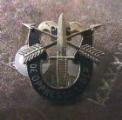I've looked, but haven't been able to find an answer to this.
What exactly is "government in a box"?
I have only found vague descriptions in newspaper articles. My understanding is that it is an attempt to swiftly install some kind of community body through which information can be relayed and collective decisions made, but that is only an educated guess. Even if that guess is correct, I have absolutely no idea what the specifics are. What types of units are involved? What are their tasks/purposes? What are their MoP/MoE? Etc?











Bookmarks